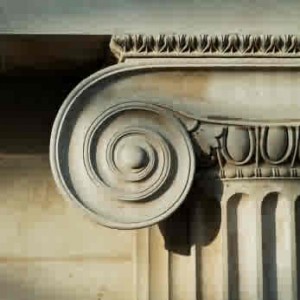What is Classical Education?
Christopher A. Perrin, M.Div, Ph.D.
Most of us have a difficult time defining the word education—it has a wide range of meaning and is used in different ways in different contexts. Certainly education can be formal (as in a college education) or informal (his stern aunt provided him a fresh education in manners).
The word classical is no easier to define. It can refer to a certain kind of music (that came well after the Greeks and Romans) and a certain kind of literature (the “classics” of western civilization). It can refer to a historical period (The Greeks and the Romans) and architecture (style, concepts and motifs from Greece and Rome). Of course it can also refer to Greek and Latin when used in the phrase classical languages.
But classical can also refer to anything that has become standard and authoritative (in a given field) as opposed to novel and experimental. Thus we can speak of classical physics and even classical book-making, bread-making or beer brewing. And of course, classical education.
Given the wide semantic range of both classical and education it is not surprising that the phrase “classical education” is also used with various meanings. Language is flexible, and so we have some varied and flexible uses of “classical education.” This means that there can be several legitimate uses of the phrase—but it would be wise to know just what a given speaker means by classical education. Here are several ways the phrase is used:
- classical education: a study of the Greek and Latin languages (linguistic definition)
- classical education: a study of the Greek and Latin languages and the history, literature, art, philosophy and culture of Greek and Roman civilization (linguistic and cultural definition)
- classical education: a study of the great ideas of western civilization as contained in the classic “great books” produced by that civilization; a study of the “best that has been thought or said.” (intellectual history definition)
- classical education: a study of the seven liberal arts of grammar, logic, rhetoric (the trivium) and arithmetic, geometry, music and astronomy (the quadrivium). (curricular definition)
- classical education: a study of the seven liberal arts employing traditional teaching insights and methods (such as singing, chanting, Socratic discussion and debate) passed down to us by past educators. (pedagogical definition)
- classical education: the cultivation of wisdom and virtue by nourishing the soul on truth, goodness and beauty by means of the seven liberal arts (soul-ish or psychological definition)
- classical education: an approach to education that seeks to create a community of learning, characterized by academic rigor, warmth and delight and involving vibrant interaction of teachers, parents, friends and others. (communal definition)
Now, all these definitions reflect current use. This is because classical education, as a rich, complex 2500 year-old tradition, does contain many important elements (linguistic, cultural, intellectual, curricular, pedagogical, psychological and communal elements). Because classical education is so rich and complex, it is hard to sum it up in one or two sentences. Here is a crack at it—this time including a theological element:
classical (and Christian) education: a traditional approach to education that blends Christian theology with the historic curriculum and pedagogy of the seven liberal arts in order to produce societal leaders characterized by wisdom, virtue and eloquence.
This may be a decent “dictionary definition,” but like so many brief definitions of complex topics, it is so general that it lacks clarity and punch. What after, all is Christian theology, pedagogy and the seven liberal arts? And if we listed the liberal arts, how many of us would like to know more about grammar, logic or rhetoric as an art? How many of us have a clear sense of what virtue and eloquence mean? But alas, when we abbreviate we must leave things out. So where do we go from here? To the same place we go after putting down the dictionary—to an article, encyclopedia, pamphlet or book; another level down.
Going another level down, we would discover that classical education has also traditionally emphasized:
- The training of leaders: those governing and leading culture were educated classically while others were trained for particular jobs and tasks
- Reflection and leisure: time for discussion, thought and application was a necessary part of acquiring wisdom, capacity and skill
- A common curriculum: students all study the essential curriculum of the seven liberal arts which were thought to prepare students for any profession or field of endeavor
- Interaction with tradition: the knowledge, wisdom and art of the past were honored and studied for present use
- Innovation according to need: classical education adapted to new geography, circumstances, discoveries and continued with “theme and variation”
- Partnership with the church: education was informed and guided by church liturgy, teaching, training and financial support
- Training affections and the intellectual virtues: educators sought to shape and form the student and not merely inform him. Students were taught to “love that which is lovely” and acquire the virtues necessary to be eager and excellent seekers of truth.
You can see how easily we could now write an article, pamphlet or book! Each of the items above deserves to be further expanded and explored.
With homeschooling parents talking increasingly about the classical approach to education, it will do everyone good to become familiar with the basic contours or essential elements of traditional, classical education. We should avoid facile, “straw man” constructions of classical education that are easy to dismiss as much as we should avoid glowing and sentimental descriptions that present it as a cure-all. By becoming more familiar with this rich tradition in education, we will better communicate and better make use of its riches.
Resources for further study:
For those beginning a study of classical education and ready for the next another level of exploration, I recommend the following:
An Introduction to Classical Education: A Guide for Parents (45 page pamphlet available in paper back but also available as a free download at Classical Academic Press.com)
Classical Education: The Movement Sweeping America (Gene Edward Veith and Andrew Kern, published by the Capital Research Center)









